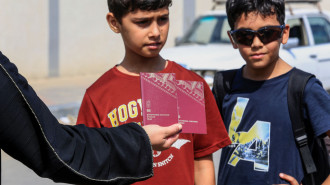Return of Syrian refugees 'top priority' in Arab summit: statement
Arab foreign ministers meeting in Amman to discuss Syria's long-running conflict agreed Monday the return of Syrian refugees was a "top priority", according to a communique released after the talks.
The talks in Jordan's capital brought together foreign ministers from Syria, Jordan, Saudi Arabia, Iraq and Egypt, in the latest regional engagement with the regime of Syrian President Bashar al-Assad.
"The voluntary and safe return of refugees to their country is a top priority, and the necessary steps must be taken immediately to implement it," the closing statement said.
Relations between many Arab states and Syria have been working over the past two years. However, recent reports suggested that some, including Qatar, Morocco, Kuwait and Yemen, are resisting Bashar al-Assad's return to the Arab fold.https://t.co/jtJpdqOHGV
— The New Arab (@The_NewArab) May 2, 2023
According to the United Nations, about 5.5 million Syrian refugees who fled since the conflict began in 2011 are registered in Lebanon, Jordan, Turkey, Iraq and Egypt.
The communique called for increased cooperation between Damascus, host countries and the United Nations to organise repatriation operations in a "clear time frame".
The ministers also agreed to "support Syria... in any legitimate efforts to extend its control over its territory, impose the rule of law, end the presence of armed and terrorist groups... and stop foreign interference in internal Syrian affairs".
Syria's civil war began in 2011 after regime forces violently suppressed mass protests. Hundreds of thousands of Syrians have been killed, mostly as a result of bombardment of civilian areas by Bashar al-Assad's regime and its ally Russia.
Several Arab countries severed ties with Damascus following the suppression of the protests in 2011.
But while Assad has been politically isolated since the conflict began, recent weeks have seen a flurry of diplomatic activity after Saudi Arabia and Iran resumed diplomatic ties in March, shifting regional relations.
Jordanian Foreign Minister Ayman Safadi noted the talks in Amman followed a "consultative meeting" in Saudi Arabia last month.
That meeting saw nine Arab countries including Gulf states meet in Jeddah to discuss ending Syria's long spell in the diplomatic wilderness and its possible return to the 22-member Arab League.
Safadi said the Amman meeting "was good and positive", and focused "on humanitarian aspects and on potential steps to alleviate the suffering of the brotherly Syrian people".
"We focused on the refugee issue and agreed on mechanisms to start the voluntary return of refugees in coordination with the United Nations," he said.
"The current situation in Syria cannot continue, and previous approaches to managing the crisis have not and will not produce anything but more destruction."
The communique called on Damascus to "improve public services in the areas" refugees would return to and lay out measures that would ensure their safety, such as an amnesty.
Human rights groups have warned that refugees face detention, torture, and even execution when returning to regime-held areas of Syria, with several documented cases of this happening.
Ahead of the talks, held at a hotel in Amman under tight security, Safadi met in private with his Syrian counterpart, Faisal Mekdad, and they discussed Arab involvement in reaching "a political solution to the Syrian crisis", the Jordanian foreign ministry said in a statement.
This was the first visit by a Syrian foreign minister to neighbouring Jordan since the conflict started.
Days after the meeting in Jeddah, Saudi Foreign Minister Prince Faisal bin Farhan visited Damascus, also a first since 2011.
While some Arab nations have moved to re-establish ties with Damascus, the reintegration of Assad's government remains a divisive issue in the region.
Assad is hoping full normalisation of ties with wealthy Gulf monarchies and other Arab states will help to finance the reconstruction of the country's war-ravaged infrastructure.
Recent reports suggested that some Arab states, including Qatar, Morocco, Kuwait and Yemen had resisted Assad's return to the Arab fold.




 Follow the Middle East's top stories in English at The New Arab on Google News
Follow the Middle East's top stories in English at The New Arab on Google News
![People gathered around the rubble of destroyed houses to search for survivors [Getty]](/sites/default/files/styles/image_330x185/public/2024-11/GettyImages-2184733820.jpg?h=199d8c1f&itok=NiM1LO2f)

